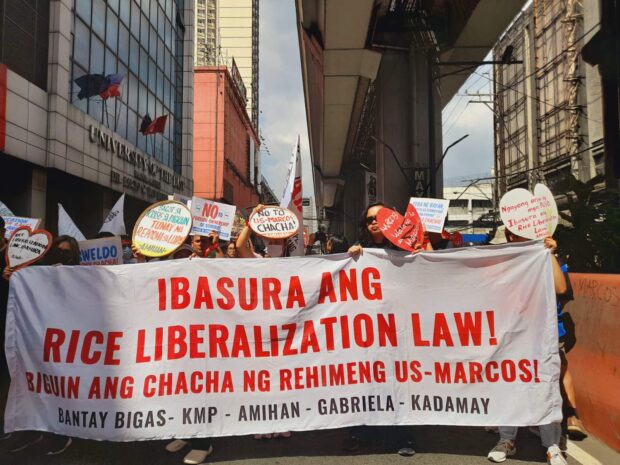Farmers to government: Junk Rice Liberalization Law

Members of progressive groups march along the streets of Manila to protest the Rice Liberalization Law, which they alleged is “anti-farmer.” (Photo from Amihan National Federation of Peasant Women)
MANILA, Philippines — Multiple farmers’ and multi-sectoral groups trooped to Mendiola Street in Manila on Wednesday to urge the government to scrap Republic Act 11203 or the Rice Liberalization Law (RLL) on the fifth anniversary of its implementation.
Members of Bantay Bigas, Kilusang Magbubukid ng Pilipinas, Amihan National Federation of Peasant Women, and Bagong Alyansang Makabayan, among others, marched from Morayta to Mendiola to protest what they said were “anti-farmer and anti-people” policies, specifically the RLL.
“The Rice Liberalization Law resulted in the monopoly control of large traders, hoarders, importers, cartels, and smugglers on the supply and distribution of rice, making the most profit at the expense of the poor and marginalized rice producers and consumers,” Bantay Bigas spokesperson Cathy Estavillo said in a statement.
The groups cited the recent report of the Philippine Statistics Authority, which said that the rice inflation in the country peaked at over 22 percent in December last year despite “lax” rules on importation.
“Despite being the top rice importing country in the world with 3.6 million metric tons, the country has reached record-breaking price inflation at 22.6% the past month, the highest since 2009,” she added.
Article continues after this advertisementThe RLL was signed by then-President Rodrigo Duterte on February 14, 2019, effectively replacing the quantitative restrictions on rice imports with tariffs.
Article continues after this advertisementThis has been consistently assailed by farmers groups who say that such a policy would mean that the country could import the staple grain without limit, further driving local rice from the market which hurts Filipino rice farmers.
‘Relying on importation
The progressive groups also slammed the current administration’s supposed reliance on importation to boost the country’s supply of the staple.
In December last year, Marcos extended the cuts on the tariff rates on pork, corn, and rice until December 31, 2024.
More recently, President Ferdinand “Bongbong” R. Marcos Jr. signed a rice deal with Vietnam in late January, where he secured rice imports of up to two million metric tons.
“[The] Marcos government doesn’t have the country’s rice self-sufficiency in sight, making both farmers and consumers victims of rising retail rice prices and falling palay farmgate prices,” Estavilla said.
For its part, the Department of Agriculture (DA) said that it is trying to boost its supply of key agricultural goods due to the effects of the dry spell which has been drying up rice paddies across 41 provinces in the country.